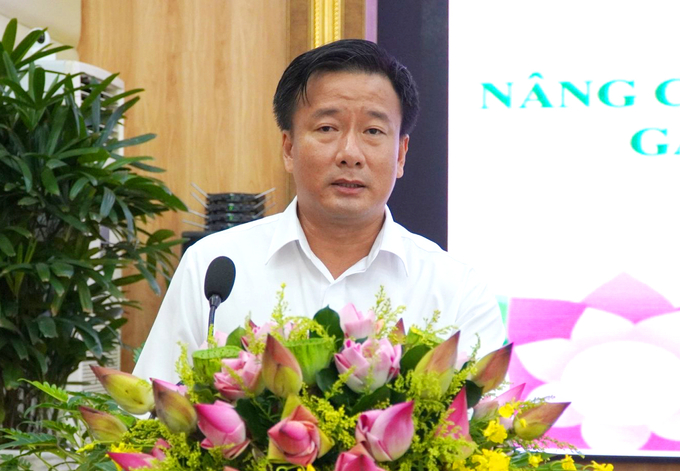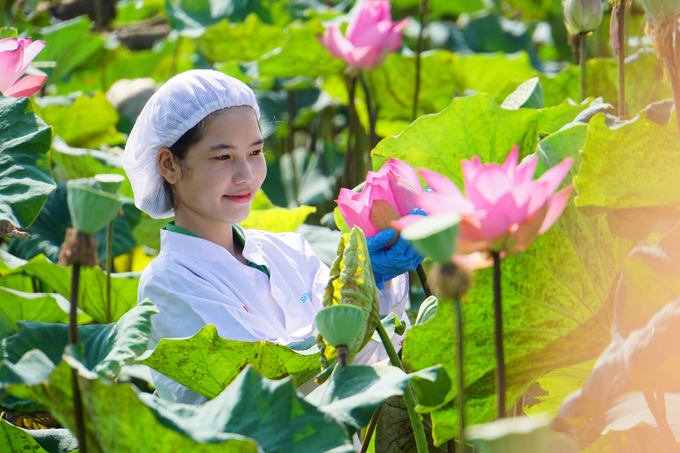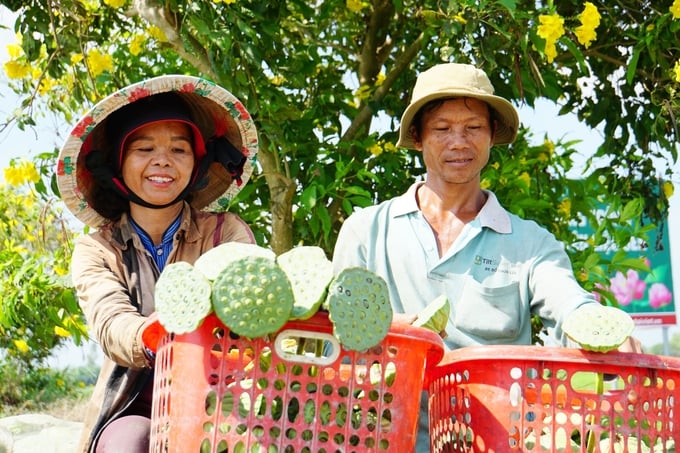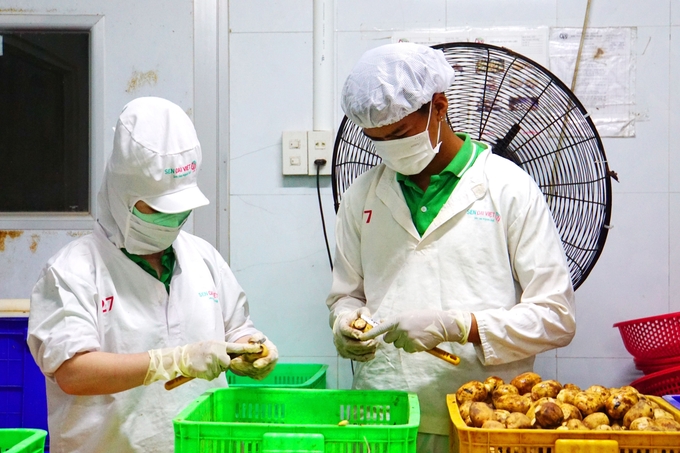November 25, 2025 | 23:06 GMT +7
November 25, 2025 | 23:06 GMT +7
Hotline: 0913.378.918
November 25, 2025 | 23:06 GMT +7
Hotline: 0913.378.918

Mr. Nguyen Phuoc Thien, Vice Chairman of the Dong Thap Provincial People's Committee, said that Dong Thap's lotus industry is developing and is well known through processed products and value-added products. Photo: Le Hoang Vu.
For the lotus industry to develop sustainably, experts assume that it is necessary to upgrade products and develop new customer segments, focusing on improving packaging, putting products on e-commerce platforms, and opening lotus experience tours.
The Dong Thap Provincial People's Committee has just organized a workshop to improve the value chain of the lotus industry associated with circulation and green growth. From there, find good solutions and models to promote Dong Thap's lotus industry to develop worthily.
Dong Thap is assessed as a locality with many unique specialties and development potential, notably the lotus plant. The Lotus has become a highlight and symbol of Dong Thap Land. Lotus is a crop that has many values, not only cultural and spiritual values but also effective application in decoration. Lotus also has a high nutritional content, especially the chemical components in parts of the lotus plant that have potential for medicinal exploitation.

Dong Thap lotus is widely exploited in the food and beverage industry, handicrafts, and other industries such as pharmaceuticals, cosmetics, fashion, souvenirs, etc. Photo: Le Hoang Vu.
A representative of the Dong Thap Lotus Industry Association said that many lotus products are being researched by businesses based on market signals, such as activated carbon from lotus seedpods, bioplastics from lotus fibers, lotus essential oil, or lotus extract. These products are expected to approach the trend of circular agriculture, contributing to affirming that lotus is not just a dish but a valuable resource with cultural and economic values. Through the Dong Thap lotus product map, it shows that the lotus plant is widely exploited in the food and beverage industry, followed by handicrafts and other industries such as pharmaceuticals, cosmetics, fashion, and souvenirs. Three parts processed into the most products include lotus leaves (27%), lotus seeds (23%), and lotus flowers (22%). Other industries, such as pharmaceuticals, cosmetics, fashion, lotus souvenirs, etc., are not yet diverse and have a lot of geographical balance.
Mr. Nguyen Phuoc Thien, Vice Chairman of the Dong Thap Provincial People's Committee, said that Dong Thap's lotus industry is developing and is widely known for its processed products and value-added products. However, the current development of the lotus industry is not as expected. Therefore, it is necessary to comprehensively evaluate and propose solutions to improve the value chain for the lotus industry in order to develop sustainably in the coming time.

Lotus is one of the key industries of the "Project to Restructure Dong Thap Province's Agriculture," with an area of over 1,800 hectares. Photo: Le Hoang Vu.
Prof. Dr. Phan Thi Thu Hien, University of Social Sciences and Humanities (National University of Ho Chi Minh City), said that lotus has great potential to build and develop tourism. However, Dong Thap lotus tourism is still in a rudimentary form, with only flower viewing locations; products and services are also simple.
Based on the experience of agricultural tourism in successful countries around the world, it is possible to reflect on strategies to enhance the value chain to develop lotus tourism. Enhancing the value chain includes product upgrading, process upgrading, functional upgrading, and cross-sector upgrading to help lotus tourism develop sustainably.
According to Ms. Hien, Dong Thap should maintain the Lotus Festival annually. In addition to the current Lotus Festival, it is necessary to add the Lotus Festival in the floating season to show the unique characteristics of lotus agricultural culture in the Mekong Delta region.
From another perspective, Dr. Pham Minh Nhut, Ho Chi Minh City University of Technology, said that the current trend is that many people are switching to a vegetarian diet because it is good for their health and has a positive impact on the environment. Lotus is an eco-friendly choice. This is an opportunity for businesses to research, develop new, improved formulas, and diversify vegan products on the market.
From a business viewpoint, Mr. Ngo Dinh Dung, Director of ISM Consulting Company, said that opportunities to improve the value chain of the lotus industry exist in every need in life. Typically, providing lotus flower supply and care services, using lotus seed pods, stems, and leaves to make organic fertilizer and lotus leaf powder to make fabric. In addition to existing lotus products, it is essential to upgrade products and develop new customer segments, focusing on improving packaging, expanding multi-channel sales, connecting with fairs, putting products on e-commerce platforms, opening lotus experience tours, etc.

Processing lotus roots for export. Photo: Le Hoang Vu.
Besides, for the lotus industry to develop sustainably, delegates assume that it is necessary to upgrade products and develop new customer segments, with a focus on improving packaging, expanding multi-channel sales, connecting with fairs, bringing products to e-commerce platforms, opening lotus experience tours, and exporting lotus products to countries around the world.
By the end of 2023, the lotus growing area in Dong Thap province had reached 1,800 hectares. Currently, the locality has collected and bred 52 lotus varieties. According to statistics, Dong Thap now has more than 100 lotus food and cosmetic products, with 59 lotus products achieving an OCOP certification of 3–4 stars. The lotus industry has an annual production value of over VND 1,900 billion. In addition to lotus products for processing food and drinking water, there are also potential products from lotus used in cosmetics, such as lotus perfume and lotus lipstick; daily household items, including lotus soap and lotus incense; or in garments and fashion (lotus silk, lotus silk fabric, lotus silk ao dai, bag, etc.).
According to the Dong Thap Department of Agriculture and Rural Development, lotus is one of the key industries of the "Project to Restructure Dong Thap Province's Agriculture," with an area exceeding 31% of the 2025 plan (currently 1,838 hectares). There are more than 50 Dong Thap lotus varieties, of which the pink lotus variety (lotus for seedpod) accounts for the highest proportion. Besides exploiting parts of the lotus plant to create products (about 100 lotus products), the province also exploits lotus tourism and lotus cuisine (200 lotus dishes have set a record).
Translated by Thu Huyen

(VAN) Deputy Minister Nguyen Quoc Tri emphasized the determination to prevent violations at CoP20, sharing enforcement results and commitments to strengthen cooperation with the international community in the coming period.

(VAN) In addition to strengthening the relationship between schools and enterprises, the Aus4Skills project expands opportunities for female students and people with disabilities to work in the transport and logistics sector.

(VAN) Nghe An is preparing policy, technical, and resource steps to participate in the forest carbon credit market.
/2025/11/25/1648-2-110733_532.jpg)
(VAN) From 2011 to 2023, Ca Mau province lost approximately 6,200 ha of coastal land and protection forests due to erosion, threatening many residential areas, infrastructure facilities, and production zones.

(VAN) Quang Ngai holds strong potential for carbon credits but needs a clear legal and policy framework to secure sustainable revenue from this resource.

(VAN) With its diverse ecosystem, Phu Quoc National Park plays a vital role in environmental protection and biodiversity conservation and serves as the core zone of the Kien Giang World Biosphere Reserve.

(VAN) Cooperation activities under the Aus4Skills program focus on: logistics professional development, competency-based training and assessment (CBTA), leadership innovation, and digitalization.